“If therefore the light that is in thee be darkness, how great is that darkness!”
(Matthew 6:23)
Light That Is In Thee
Dear Friends,
Greetings! As we are sure you are aware there has been a tremendous amount of coverage in both the mainstream and alternative media as to what many see as a threat to “western civilization, culture and philosophy”.
At one time Christianity was the foundation upon which “western culture” was built. Does that continue to ring true today? Europe, for the most part, has admittedly entered what many term a post-Christian period.
A recent headline article from BREITBART reports, “Gatestone Institute: 423 New Mosques, 500 Closed Churches in London”, and states, “its new 423 mosques, is built on the sad ruins of English Christianity”.
The US, although not yet in as bad a situation, is following not far behind. This is especially true of the generation of the “Millennials” and the watering down of many of the Bible's teachings by churches that have compromised.
If Christianity is no longer the driving force upon which western civilization is based what then is the foundation for western culture and philosophy today?
We try to answer that question below.
Have a great week ahead.
***
Western culture - Wikipedia
“A cornerstone of Western thought, beginning in ancient Greece and continuing through the Middle Ages and Renaissance and into modern times, is a tradition of rationalism in various spheres of life, developed by Hellenistic philosophy, Scholasticism, humanism, the Scientific revolution and the Enlightenment. Values of Western culture have, throughout history, been derived from political thought, widespread employment of rational argument favouring freethought, assimilation of human rights, the need for equality, and democracy.
Ancient Greece is considered the birthplace of Western culture, with the world's first democratic system of government and major advances in philosophy, science, and mathematics. Greece was followed by Rome, which made key contributions in law, government, engineering and political organization. Western culture continued to develop with the Christianisation of Europe during the Middle Ages, the reform and modernization triggered by the Renaissance, and with globalization by successive European empires, that spread European ways of life and European educational methods around the world between the 16th and 20th centuries. European culture developed with a complex range of philosophy, medieval scholasticism, and mysticism, and Christian and secular humanism. Rational thinking developed through a long age of change and formation, with the experiments of the Enlightenment, and breakthroughs in the sciences. Tendencies that have come to define modern Western societies include the existence of political pluralism, prominent subcultures or countercultures (such as New Age movements), and increasing cultural syncretism resulting from globalization and human migration.” (Emphesis added.)
#
Western Philosophy - Wikipedia
“Western philosophy is the philosophical thought and work of the Western world. Historically, the term refers to the philosophical thinking of Western culture, beginning with Hellenic (i.e. Greek) philosophy of the Pre-Socratics such as Thales (c. 624 – c. 546 BC) and Pythagoras (c. 570 – c. 495 BC), and eventually covering a large area of the globe. The word philosophy itself originated from the Hellenic: philosophia (φιλοσοφία), literally, "the love of wisdom" (φιλεῖν philein, "to love" and σοφία sophia, "wisdom").
The scope of philosophy in the ancient understanding, and the writings of (at least some of) the ancient philosophers, were all intellectual endeavors.
Socrates
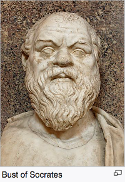 The key figure in Greek philosophy is Socrates. Socrates studied under several Sophists but transformed Greek philosophy into a unified and continuous project that is still pursued today. It is said that following a visit to the Oracle of Delphi he spent much of his life questioning anyone in Athens who would engage him, in order to disprove the oracular prophecy that there would be no man wiser than Socrates.
The key figure in Greek philosophy is Socrates. Socrates studied under several Sophists but transformed Greek philosophy into a unified and continuous project that is still pursued today. It is said that following a visit to the Oracle of Delphi he spent much of his life questioning anyone in Athens who would engage him, in order to disprove the oracular prophecy that there would be no man wiser than Socrates.
Plato
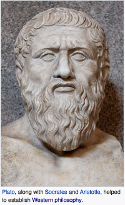 Socrates' most important student was Plato. Plato founded the Academy of Athens and wrote a number of dialogues, which applied the Socratic method of inquiry to examine philosophical problems. Some central ideas of Plato's dialogues are the immortality of the soul, the benefits of being just, that evil is ignorance, and the Theory of Forms.
Socrates' most important student was Plato. Plato founded the Academy of Athens and wrote a number of dialogues, which applied the Socratic method of inquiry to examine philosophical problems. Some central ideas of Plato's dialogues are the immortality of the soul, the benefits of being just, that evil is ignorance, and the Theory of Forms.
Aristotle
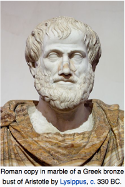 Plato's most outstanding student was Aristotle. Aristotle was perhaps the first truly systematic philosopher and scientist. He wrote books on physics, biology, zoology, metaphysics, aesthetics, poetry, theater, music, rhetoric, politics and logic. Aristotelian logic was the first type of logic to attempt to categorize every valid syllogism. Aristotle tutored Alexander the Great. Aristotelian philosophy exercised considerable influence on almost all western philosophers, including Greek, Roman, Christian, Jewish, and Islamic thinkers.” (Emphesis added.)
Plato's most outstanding student was Aristotle. Aristotle was perhaps the first truly systematic philosopher and scientist. He wrote books on physics, biology, zoology, metaphysics, aesthetics, poetry, theater, music, rhetoric, politics and logic. Aristotelian logic was the first type of logic to attempt to categorize every valid syllogism. Aristotle tutored Alexander the Great. Aristotelian philosophy exercised considerable influence on almost all western philosophers, including Greek, Roman, Christian, Jewish, and Islamic thinkers.” (Emphesis added.)
#
The following is extracted from David Flynn's book CYDONIA: The Secret Chronicles of Mars. Chapter six. Ed.
“Apuleius of Madauros (born c. 123 AD, d. c. 170) is best kknown as the author of the Metamosphoses, otherwias know as The Golden Ass. He was a poet, philosopher, and rhetorican from whom numerous works survive. In his work The Defense he wrote:I do, however, believe Plato: certain divine beings, intermediary in character and position, have been placed between the gods and human beings, and they guide the divinations and miracles of magicians.74
The Greek philosophers from Plato onward believed the “demons” were guides for illumined men. The Neoplatonic term for spiritual illumination was Daimonion Photi (Greek.)75 Socrates said he had a lifetime daimon that always warned him of danger and bad judgment, but never directed his actions. This explained the source of Socrates wisdom, as coming from his daimon, Roman orator Cicero said:
Socrates was the first to bring philosophy down from the heavens. (Cicero Tusculan Disputations, V, 4, 10)
Plato recorded that Socrates sid:
By the favor of the Gods I have, since my childhood, been attended by a semi-divine being whose voice, from time to time, dissuades me from some undertaking, but never directs me what I am to do.
Socrates implied that daimons are the children of divine and human parents, (i.e. demigods).76 Xenophon in the Apology for Socrates quotes him as saying:
This prophetic voice has been heard by me throughout my life; it is certainly more trustworthy than omens from the flight or entrails of birds; I call it a God or a daimon. I have told my friends the warnings I have received, and up to now the voice has never been wrong.77
The Neoplatonists of the school of Iamblichus were called “theurgists,” a term that still applies to the metholology of modern initiates in the msteries. Theurgy was a method of individual communion with the gods, of bringing the wisdom of the gods down to earth—or bringing down the gods themselves.
The practice of theurgy would only convery influence from the gods if the symbols and rituals used were actually taught by the gods. This is why Plato said that “great power of geometric equality [exists] amongst both gods and men.82 The Theurgic concepts suggest that the use of anagrams, symbols and numbers by Pythagoras and his followers expressed more than the mystery teachings of the Egyptians...the symbols were used to invoke Diamones.”
(This is exactly what is found in the Key of Solomon, which we dealt with previously, about invoking demons. Ed)
74. Apuleius ApologiaAPVLEII43 Translated by H. E. Butler.
75. Theosophic library online. Http://www.theosociety.or
76. Rosemary Ellen Guiley, The Encyclopedia of Witches and Withcraft. NewYork: Facts On File,
1989
77. The Cambridge Dictionary of Philioophy, Cambridge University Press, 1995
82. Plato, In Georgias, section 508A
(Extracted from David Flynn's book CYDONIA: The Secret Chronicles of Mars. Chapter six.)
#
Maimonides
 “During his lifetime, most Jews greeted Maimonides' writings on Jewish law and ethics with acclaim and gratitude, even as far away as Iraq and Yemen, and although Maimonides rose to become the revered head of the Jewish community in Egypt, there were also vociferous critics of some of his writings, particularly in Spain. Nonetheless, he was posthumously acknowledged as among the foremost rabbinical arbiters and philosophers in Jewish history, and his copious work comprises a cornerstone of Jewish scholarship. His fourteen-volume Mishneh Torah still carries significant canonical authority as a codification of Talmudic law. He is sometimes known as "ha Nesher ha Gadol" (the great eagle) in recognition of his outstanding status as a bona fide exponent of the Oral Torah.
“During his lifetime, most Jews greeted Maimonides' writings on Jewish law and ethics with acclaim and gratitude, even as far away as Iraq and Yemen, and although Maimonides rose to become the revered head of the Jewish community in Egypt, there were also vociferous critics of some of his writings, particularly in Spain. Nonetheless, he was posthumously acknowledged as among the foremost rabbinical arbiters and philosophers in Jewish history, and his copious work comprises a cornerstone of Jewish scholarship. His fourteen-volume Mishneh Torah still carries significant canonical authority as a codification of Talmudic law. He is sometimes known as "ha Nesher ha Gadol" (the great eagle) in recognition of his outstanding status as a bona fide exponent of the Oral Torah.
Influence
Maimonides's Mishneh Torah is considered by Jews even today as one of the chief authoritative codifications of Jewish law and ethics. It is exceptional for its logical construction, concise and clear expression and extraordinary learning, so that it became a standard against which other later codifications were often measured. It is still closely studied in rabbinic yeshivot (academies).
But Maimonides was also one of the most influential figures in medieval Jewish philosophy. His brilliant adaptation of Aristotelian thought to Biblical faith deeply impressed later Jewish thinkers, and had an unexpected immediate historical impact. Some more acculturated Jews in the century that followed his death, particularly in Spain, sought to apply Maimonides's Aristotelianism in ways that undercut traditionalist belief and observance, giving rise to an intellectual controversy in Spanish and southern French Jewish circles. The intensity of debate spurred Catholic Church interventions against "heresy" and a general confiscation of rabbinic texts. In reaction, the more radical interpretations of Maimonides were defeated. At least amongst Ashkenazi Jews, there was a tendency to ignore his specifically philosophical writings and to stress instead the rabbinic and halakhic writings.
Maimonidean thought continues to influence traditionally observant Jews.
The most rigorous medieval critique of Maimonides is Hasdai Crescas's Or Adonai. Crescas bucked the eclectic trend, by demolishing the certainty of the Aristotelian world-view, not only in religious matters but also in the most basic areas of medieval science (such as physics and geometry). Crescas's critique provoked a number of 15th-century scholars to write defenses of Maimonides.
Because of his path-finding synthesis of Aristotle and Biblical faith, Maimonides had a fundamental influence on the great Christian theologian Saint Thomas Aquinas. Aquinas refers specifically to Maimonides in several of his works, including the Commentary on the Sentences.
(Of his 13 principles of faith number 12 is “The coming of the Jewish Messiah.”)
Prophecy
He agrees with "the Philosopher" (Aristotle) in teaching that the use of logic is the "right" way of thinking. In order to build an inner understanding of how to know God, every human being must, by study, meditation and uncompromising strong will, attain the degree of complete logical, spiritual and physical perfection required in the prophetic state. Here he rejects previous ideas (especially portrayed by Rabbi Yehuda Halevi in "Hakuzari") that in order to become a prophet, God must intervene. Maimonides claims that any man has the potential to become a prophet (not just Jews) and that in fact it is the purpose of the human race.” (Emphasis added.) Wikipedia
“In real practical and philosophical belief, Maimonides by his own admission and practice was a thorough-going Hellenist who insisted that the Jewish nation give up the simple and plain teachings of Moses on several important Old Testament doctrines and to adopt in their place the "Greek philosophical way" (notably the concepts of Aristotle). The word "Hellenist" came to mean anyone who adopted the pagan teachings of the Greeks and Romans. Maimonides was a Hellenist.
Let me give an example of what I mean. In all places of the Holy Scriptures (and also among the Jewish Sages of the Talmudic period) God is defined in anthropomorphic terms. That is, He is consistently described as being like humans in appearance. In the first chapter of Genesis, we find that human beings are made in the likeness and image of God. And this teaching dominates all pages of the Holy Scriptures. The New Testament advocates the same thing. God is reckoned to look in body-form just like Jesus Christ (expressly so – Hebrews 1:3) and Christ Jesus is even described in his glorified condition at the present to be an anthropos (a man) (see I Timothy 2:4-6). When man observes this image of Deity, the Scriptures show that God looks like all humans. This is the scriptural teaching. Indeed, the design of the Holy Temple at Jerusalem showed the anthropomorphic appearance of God. Maimonides, however, found this belief to be very distasteful and unsatisfactory to him. It was not the manner in which many of the philosophers of his time (twelfth and early thirteenth centuries) viewed the Creator. In order to alter this long held belief by early Jewish teachers (including all the writers of the Holy Scriptures), Maimonides dogmatically stated in his "Third Principle of the Jewish Faith" the statement that "God has no body." There was uproar among Jewish scholars at the time over his assertion (among other foreign doctrines that Maimonides taught), but within 200 years almost all scholars within Judaism accepted this teaching of Maimonides. What Maimonides did was to allegorize every statement in the Scriptures or written by the Talmudic Sages that suggested that God had body parts like a human. The symbolism of the Temple, however, gave Maimonides some major criticisms of his personal belief that God did not have a body like humans (or, that God had any body at all).
It was the actions of Maimonides over his dislike of the Temple features (because it promoted anthropomorphic descriptions of God) that helped in making the Jewish people forget even where their former Temples were located in Jerusalem. The Mosaic and biblical Temple design and rules and regulations of the Temple were totally anthropomorphic in their outward appearance and this was an anathema to Maimonides in his heart of hearts. As a matter of fact, in his own ideal Temple that he recorded in his book "Guide for the Perplexed", Maimonides had Aristotle and his teachings positioned solidly within the Holy of Holies (along with Moses, whom he taught believed like Aristotle), while the ordinary Jewish people with their Rabbis still teaching Moses and the Holy Scriptures in the biblical sense were left out of his Holy of Holies. Maimonides even called the eminent Rabbis who believed that God had a body as the Tanak (the Old Testament) taught along with the Talmud, as nothing more than ignoramuses.
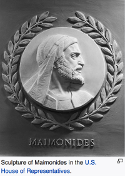 The truth is Maimonides’ book "Guide for the Perplexed" is pure heresy to all the principles of the early Jewish faith of those who lived during Temple times and in the period of the Talmuds as well as those who wrote the teachings of the Holy Scriptures. Quite a number of Jewish scholars who have studied it admit this is a true appraisal. The "Guide" is an attempt to make Hellenism (in its philosophic sense) the official doctrine of Judaism. But the teaching is heathen to the core. What Antiochus Epiphanes and the emperor Hadrian tried to do with their armed forces to coerce the Jewish people to accept the normal teachings of Hellenism (that is, force them to accept Hellenism alongside their Judaism as the proper ecumenical philosophical and religious standard), Maimonides who retained his status as a Jew accomplished in his time (and for 200 years afterward) what Antiochus and Hadrian set out to do...Maimonides did his work of destroying the true teachings of the Tanak (the Holy Scriptures) as a Jew who openly taught "orthodoxy" to the Jewish masses and did this without firing a shot of antagonism against his people. He attempted (and in all accounts he succeeded) to turn Judaism into Hellenism.”
(Emphasis added.)
The truth is Maimonides’ book "Guide for the Perplexed" is pure heresy to all the principles of the early Jewish faith of those who lived during Temple times and in the period of the Talmuds as well as those who wrote the teachings of the Holy Scriptures. Quite a number of Jewish scholars who have studied it admit this is a true appraisal. The "Guide" is an attempt to make Hellenism (in its philosophic sense) the official doctrine of Judaism. But the teaching is heathen to the core. What Antiochus Epiphanes and the emperor Hadrian tried to do with their armed forces to coerce the Jewish people to accept the normal teachings of Hellenism (that is, force them to accept Hellenism alongside their Judaism as the proper ecumenical philosophical and religious standard), Maimonides who retained his status as a Jew accomplished in his time (and for 200 years afterward) what Antiochus and Hadrian set out to do...Maimonides did his work of destroying the true teachings of the Tanak (the Holy Scriptures) as a Jew who openly taught "orthodoxy" to the Jewish masses and did this without firing a shot of antagonism against his people. He attempted (and in all accounts he succeeded) to turn Judaism into Hellenism.”
(Emphasis added.)
From Maimanides -Saint and Heretic by Ernest L. Martin Ph.D.
#
Thomas Aquinas - Wikipedia
 Saint Thomas Aquinas O.P. (/əˈkwaɪnəs/; Italian: Tommaso d'Aquino, lit. 'Thomas of Aquino'; 1225 – 7 March 1274), was an Italian Dominican friar, Catholic priest, and Doctor of the Church. He was an immensely influential philosopher, theologian, and jurist in the tradition of scholasticism, within which he is also known as the Doctor Angelicus and the Doctor Communis.
Saint Thomas Aquinas O.P. (/əˈkwaɪnəs/; Italian: Tommaso d'Aquino, lit. 'Thomas of Aquino'; 1225 – 7 March 1274), was an Italian Dominican friar, Catholic priest, and Doctor of the Church. He was an immensely influential philosopher, theologian, and jurist in the tradition of scholasticism, within which he is also known as the Doctor Angelicus and the Doctor Communis.
He was the foremost classical proponent of natural theology and the father of Thomism; of which he argued that reason is found in God. His influence on Western thought is considerable, and much of modern philosophy developed or opposed his ideas, particularly in the areas of ethics, natural law, metaphysics, and political theory. Unlike many currents in the Church of the time, Thomas embraced several ideas put forward by Aristotle—whom he called "the Philosopher"—and attempted to synthesize Aristotelian philosophy with the principles of Christianity. The works for which he is best known are the Summa Theologiae and the Summa contra Gentiles. His commentaries on Scripture and on Aristotle form an important part of his body of work. Furthermore, Thomas is distinguished for his eucharistic hymns, which form a part of the Church's liturgy.
The Catholic Church honors Thomas Aquinas as a saint and regards him as the model teacher for those studying for the priesthood, and indeed the highest expression of both natural reason and speculative theology. In modern times, under papal directives, the study of his works was long used as a core of the required program of study for those seeking ordination as priests or deacons, as well as for those in religious formation and for other students of the sacred disciplines (philosophy, Catholic theology, church history, liturgy, and canon law).
Thomas Aquinas is considered one of the Catholic Church's greatest theologians and philosophers. Pope Benedict XV declared: "This (Dominican) Order ... acquired new luster when the Church declared the teaching of Thomas to be her own and that Doctor, honored with the special praises of the Pontiffs, the master and patron of Catholic schools." The English philosopher Anthony Kenny considers Aquinas to be 'one of the dozen greatest philosophers of the western world'. (Emphesis added.)
#
So, what is left when Christianity is eradicated from western civilization? The Mystery Schools, the Secret Societys, the New World Order, the “illumined” ones. It was all planned to happen.
#
“Throughout history, theurgists sought to call down the influences of the divine intelligences called gods or daimones. Theurgists used ritual and “mirroring” through “similarities” in order to motivate the daimones to bestow upon them political power, wisdom and vitality. These are attributes striven for by governments and initiated rulers even in this present age.
The initiates of the mystery schools who worshipped the builder-gods of myth had at the heart of their purpose the resurrection of the lost age of the gods.
Modern mystery schools teach that the God in the Old Testament account of the Garden of Eden was jealous, and prevented man from attaining the knowledge of eternal life, which was about to be imparted by the serpent. The ultimate understanding of the mystery school of Gnosticism is that the serpent that brings wisdom-but opposes the God of the Bible-is beneficial to mankind, enabling man to evolve and transform.” CYDONIA:The Secret Chronicles Of Mars – David Flynn
#
Moral practice has always been difficult for fallen humanity, but at least there was always the lighthouse of moral principles, no matter how stormy the sea of moral practice got. But today, with the majority of our mind-molders, in formal education, or informal education—that is, media—the light is gone. Morality is a fog of feelings. That is why to them, as Chesterton said, “Morality is always dreadfully complicated to a man who has lost all his principles.” Principles mean moral absolutes. Unchanging rocks beneath the changing waves of feelings and practices. … How important is this issue? After all, it’s just philosophy, and philosophy is just ideas. But ideas have consequences. Sometimes these consequences are as momentous as a holocaust, or a Hiroshima. Sometimes even more momentous. Philosophy is just thought, but sow a thought, reap an act; sow an act, reap a habit; sow a habit, reap a character; sow a character, reap a destiny. This is just as true for societies as it is for individuals.—Peter Kreeft
#
“Now while Paul waited for them at Athens, his spirit was stirred in him, when he saw the city wholly given to idolatry. Therefore disputed he in the synagogue with the Jews, and with the devout persons, and in the market daily with them that met with him.
Then certain philosophers of the Epicureans, and of the Stoicks, encountered him. And some said, What will this babbler say? other some, He seemeth to be a setter forth of strange gods: because he preached unto them Jesus, and the resurrection. And they took him, and brought him unto Areopagus, saying, May we know what this new doctrine, whereof thou speakest, [is? ] For thou bringest certain strange things to our ears: we would know therefore what these things mean. (For all the Athenians and strangers which were there spent their time in nothing else, but either to tell, or to hear some new thing.)
Then Paul stood in the midst of Mars’ hill, and said, [Ye] men of Athens, I perceive that in all things ye are too superstitious. For as I passed by, and beheld your devotions, I found an altar with this inscription, TO THE UNKNOWN GOD. Whom therefore ye ignorantly worship, him declare I unto you. God that made the world and all things therein, seeing that he is Lord of heaven and earth, dwelleth not in temples made with hands; Neither is worshipped with men’s hands, as though he needed any thing, seeing he giveth to all life, and breath, and all things; And hath made of one blood all nations of men for to dwell on all the face of the earth, and hath determined the times before appointed, and the bounds of their habitation; That they should seek the Lord, if haply they might feel after him, and find him, though he be not far from every one of us: For in him we live, and move, and have our being; as certain also of your own poets have said, For we are also his offspring.
Forasmuch then as we are the offspring of God, we ought not to think that the Godhead is like unto gold, or silver, or stone, graven by art and man’s device. And the times of this ignorance God winked at; but now commandeth all men every where to repent: Because he hath appointed a day, in the which he will judge the world in righteousness by [that] man whom he hath ordained; [whereof] he hath given assurance unto all [men,] in that he hath raised him from the dead.
And when they heard of the resurrection of the dead, some mocked: and others said, We will hear thee again of this [matter. ] So Paul departed from among them.” Acts 17:16-33
“As ye have therefore received Christ Jesus the Lord, [so] walk ye in him: Rooted and built up in him, and stablished in the faith, as ye have been taught, abounding therein with thanksgiving. Beware lest any man spoil you through philosophy and vain deceit, after the tradition of men, after the rudiments of the world, and not after Christ.” Colossians 2:6-9
“Knowledge puffeth up, but charity edifieth.” 1 Corinthians 8:1 (Emphasis added.)
***
MailOnline
One country, two religions and three very telling pictures: The empty pews at churches just yards from an overcrowded mosque
Two photos show Sunday morning services in churches in East London
The third shows worshippers gathered for Friday midday prayers outside a nearby mosque
The difference in numbers could hardly be more dramatic
By GUY WALTERS
PUBLISHED: 23:32, 29 May 2013 | UPDATED: 01:05, 30 May 2013
Set aside the fact that our Queen is the Defender of the Christian Faith. Ignore the 26 Church of England bishops who sit in the House of Lords.
Pay no attention to the 2011 Census that told us 33.2 million people in England and Wales describe themselves as Christians.
For if you want a more telling insight into religion in the United Kingdom today, just look at these photographs. The story they tell is more revealing than any survey.

The photo on the left shows St Mary's Church in Cable Street while the photo on the right shows worshippers gathered for Friday midday prayers outside a nearby mosque in Spitalfields, both in East London
What they show are three acts of worship performed in the East End of London within a few hundred yards of each other at the end of last month.
Two of the photos show Sunday morning services in the churches of St George-in-the-East on Cannon Street Road, and St Mary’s on Cable Street.
The third shows worshippers gathered for Friday midday prayers outside the nearby mosque on the Brune Street Estate in Spitalfields.
The difference in numbers could hardly be more dramatic. At St George’s, some 12 people have congregated to celebrate Holy Communion.
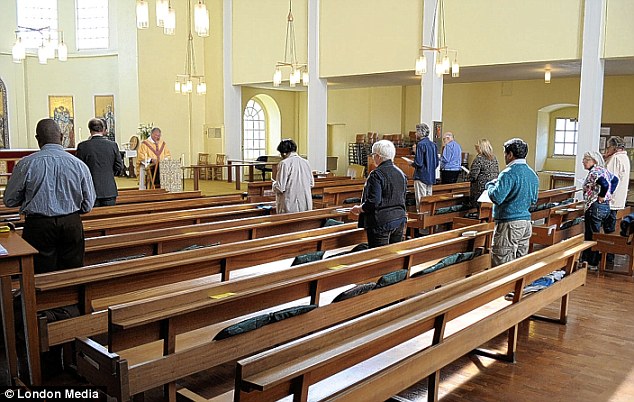
Empty pews: 18th-century parishioners crowded into St George-in-the-East hear John Wesley. Only 12 people attended the service
When the church was built in the early 18th century, it was designed to seat 1,230.
Numbers are similar at St Mary’s, opened in October 1849. Then, it could boast a congregation of 1,000. Today, as shown in the picture, the worshippers total just 20.
While the two churches are nearly empty, the Brune Street Estate mosque has a different problem — overcrowding.
The mosque itself is little more than a small room rented in a community centre, and it can hold only 100.
However, on Fridays, those numbers swell to three to four times the room’s capacity, so the worshippers spill out onto the street, where they take up around the same amount of space as the size of the near-empty St Mary’s down the road.
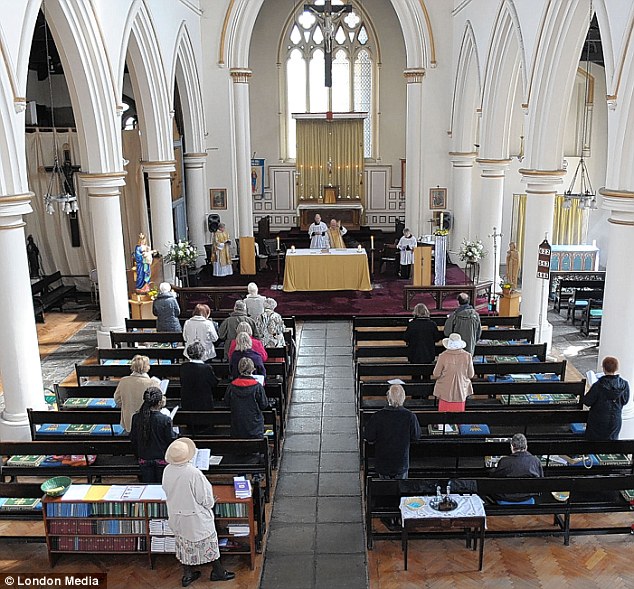
Dwindling flock: St Mary's Cable Street in East London was built to hold 1,000 people. Today, the congregation numbers around 20
What these pictures suggest is that, on current trends, Christianity in this country is becoming a religion of the past, and Islam is one of the future.
In the past ten years, there has been a decrease in people in England and Wales identifying as Christian, from 71.7 per cent to 59.3 per cent of the population.
In the same period the number of Muslims in England and Wales has risen from 3 per cent of the population to 4.8 per cent — 2.7 million people.
And Islam has age on its side. Whereas a half of British Muslims are under 25, almost a quarter of Christians are approaching their eighth decade.
It is estimated that in just 20 years, there will be more active Muslims in this country than churchgoers — an idea which even half a century ago would have been utterly unthinkable.
Many will conclude with a heavy heart that Christianity faces a permanent decline in Britain, its increasingly empty churches a monument to those centuries when the teachings of Christ governed the thoughts and deeds of the masses.
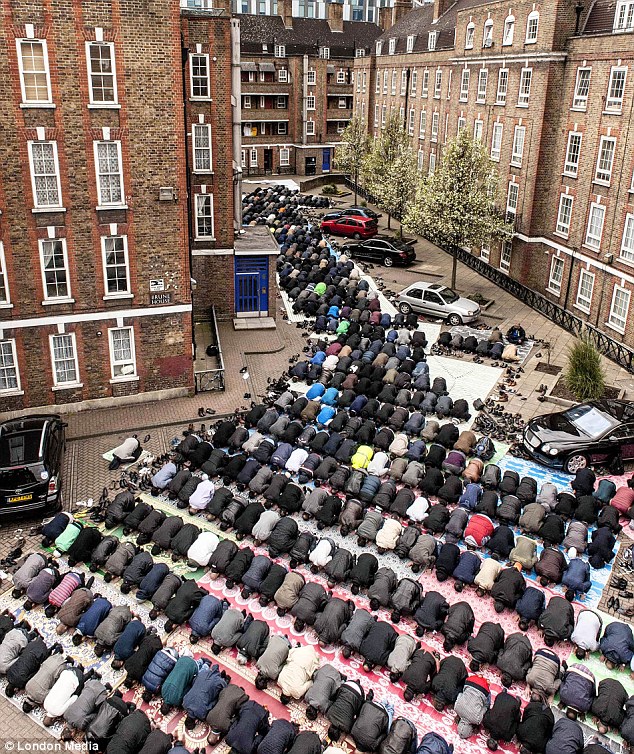
A study in devotion: The tiny mosque on the Brune Street Estate, Spitalfields, holds only 100 people, so the local Bangladeshi community throng the street for Friday midday prayers
On Sunday October 1, 1738, St George’s was packed twice during the day to hear the great evangelist John Wesley, who then preached at the church for the following week explaining, as he put it, ‘the way of salvation to many who misunderstood what had been preached concerning it’.
Today, there are no John Wesleys to fill up the pews. The church does its best, offering, for example, a monthly ‘Hot Potato Sunday’, during which the few congregants can discuss the readings of the day over a baked potato.
Canon Michael Ainsworth of St George’s puts on a brave face when he says: ‘What we are saying now is it is not just a matter of numbers. It is about keeping faith with the city and hanging in there — being part of the community.’
At St Mary’s, meanwhile, Rev Peter McGeary cannot explain why the numbers are so low: ‘It’s impossible to say, there are so many variables.’
When he is asked if he tries to boost his congregations, he simply replies: ‘We are not a company, we are a church.’
In contrast, there seems a remarkable energy attached to the mosque on Brune Street, which has been described as the ‘Mecca of the City’.
Here, come rain or shine, members of the Bangladeshi community perform the Friday prayer of Jumma under the open sky. It is a communal act which will surely only grow in popularity.
Sadly, that’s not something that can be said of the two nearby churches, and unless they can reinvigorate their congregations they may finally end up being deconsecrated.
When that happens, such large buildings will be attractive spaces for those who can fill them.
One day, in a few decades, St George’s may well again be packed with worshippers — but they will not be Christians.
BREITBART
Gatestone Institute: 423 New Mosques, 500 Closed Churches in London
Getty
by GIULIO MEOTTI (GATESTONE INSTITUTE)2 Apr 20177241
The Gatestone Institute reports Sunday on the striking rate of closures of churches in the United Kingdom’s capital city, a trend mirrored elsewhere in Europe, and the blooming number of mosques that have been established in their stead.
Reporting on the change in religious observation in London, the Gatestone Institute writes:
“London is more Islamic than many Muslim countries put together”, according to Maulana Syed Raza Rizvi, one of the Islamic preachers who now lead “Londonistan”, as the journalist Melanie Phillips has called the English capital. No, Rizvi is not a right-wing extremist. Wole Soyinka, a Nobel Laureate for Literature, was less generous; he called the UK “a cesspit for Islamists”.
“Terrorists can not stand London multiculturalism”, London’s mayor Sadiq Khan said after the recent deadly terror attack at Westminster. The opposite is true: British multiculturalists are feeding Islamic fundamentalism. Above all, Londonistan, with its new 423 mosques, is built on the sad ruins of English Christianity.
The Hyatt United Church was bought by the Egyptian community to be converted to a mosque. St Peter’s Church has been converted into the Madina Mosque. The Brick Lane Mosque was built on a former Methodist church. Not only buildings are converted, but also people. The number of converts to Islam has doubled; often they embrace radical Islam, as with Khalid Masood, the terrorist who struck Westminster.
The Daily Mail published photographs of a church and a mosque a few meters from each other in the heart of London. At the Church of San Giorgio, designed to accommodate 1,230 worshipers, only 12 people gathered to celebrate Mass. At the Church of Santa Maria, there were 20.
The nearby Brune Street Estate mosque has a different problem: overcrowding. Its small room and can contain only 100. On Friday, the faithful must pour into the street to pray. Given the current trends, Christianity in England is becoming a relic, while Islam will be the religion of the future.
INDEPENDENT
Ireland ordered to loosen abortion laws by Council of Europe
Current laws deepen social inequalities and lead to traumatic, clandestine procedures, Nils Muiznieks says
Padraic Halpin
Thursday 30 March 2017 18:36 BST
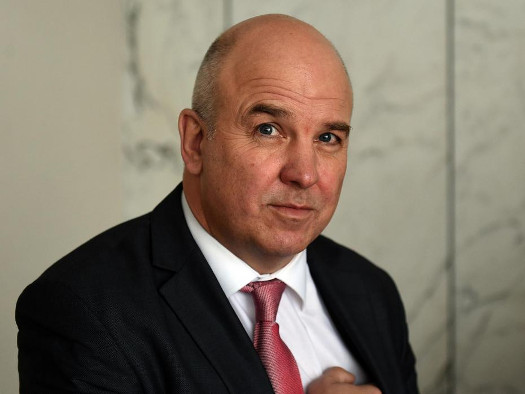
'It's an unjust regime because it doesn't actually affect the number of abortions,' Nils Muiznieks says, 'If a woman has means to travel, she will do so, so that leave poorer women to fend for themselves in Ireland' JANEK SKARZYNSKI/AFP/Getty Images
Ireland must loosen its strict abortion laws and replace them with a regime more respectful to women's rights, the Council of Europe's human rights commissioner has said.
Rules on terminating a pregnancy in once stridently Catholic Ireland are among the world's most restrictive and a referendum on widening access could be held if a citizens' assembly set up by government recommends it in a decision expected next month.
At present, terminations are allowed only if a mother's life is in danger, after a total ban was lifted in 2013, a provision Commissioner Nils Muiznieks said still has a "chilling" effect on doctors who must decide who meets restrictive requirements.
The Council, not part of the European Union, is a pan-European body concerned primarily with the region's human rights.
"It's an unjust regime because it doesn't actually affect the number of abortions. If a woman has means to travel, she will do so, so that leave poorer women to fend for themselves in Ireland," Mr Muiznieks told Reuters in a telephone interview.
This deepens social inequalities and often leads to traumatic, clandestine procedures, Mr Muiznieks said in a Council of Europe report covering a range of human rights issues in Ireland.
"Culturally, politically, socially, Ireland has changed significantly and I think that is not reflected in the current regime," he said.
Mr Muiznieks joined the United Nations Human Rights Committee in recommending that at a very minimum, the Irish government should decriminalise abortion and widen the law to allow for abortion in cases of fatal fetal abnormality, rape or incest.
In a letter responding to the recommendations, Ireland's government said the current laws do not prevent a doctor communicating in a normal way with regards to a patient's care.
The report was also critical of the government's handling of past abuses of women and children at Church-run institutions, saying enquiries into different cases had been inconsistent and redress proposed to victims inadequate.
The comments came after Ireland said it may widen an inquiry into so-called "mother-and-baby homes" -- one of three areas where shortcomings were identified in the report -- after the remains of babies ranging from new-born to three-years-old were found in the sewers of one such home this month.
While the Catholic Church ran many of Ireland's social services in the 20th century, they did so with state funding and the report expressed concern that in most cases, the state's accountability "has not been fully accepted, if at all"
The government's response did not specifically mention "mother-and-baby homes" but it said authorities will give the recommendations careful attention.
"The approach of the government heretofore has been quite ad-hoc. The people have waited a long time, if you're going to do it, do it right. These are quite serious human rights violations we're talking about," Muiznieks said.
"The government cannot wash its hands of the human rights violations that took place. It's quite uncomfortable to have this mirror in front of you but the only way to move on is to provide justice."
***
***
AP
Cyborgs at work: employees getting implanted with microchips
By JAMES BROOKS
Apr. 3, 2017 4:53 PM EDT
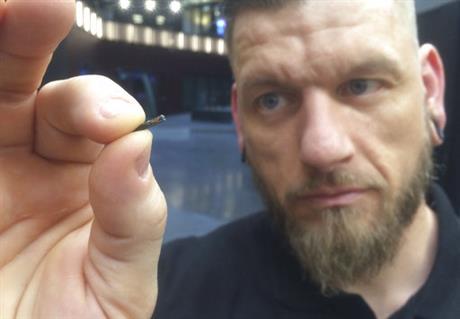
lf-described “body hacker” Jowan Osterlund from Biohax Sweden, holds a small microchip implant,...
STOCKHOLM (AP) — The syringe slides in between the thumb and index finger. Then, with a click, a microchip is injected in the employee's hand. Another "cyborg" is created.
What could pass for a dystopian vision of the workplace is almost routine at the Swedish startup hub Epicenter. The company offers to implant its workers and startup members with microchips the size of grains of rice that function as swipe cards: to open doors, operate printers, or buy smoothies with a wave of the hand.
The injections have become so popular that workers at Epicenter hold parties for those willing to get implanted.
"The biggest benefit I think is convenience," said Patrick Mesterton, co-founder and CEO of Epicenter. As a demonstration, he unlocks a door by merely waving near it. "It basically replaces a lot of things you have, other communication devices, whether it be credit cards or keys."
The technology in itself is not new. Such chips are used as virtual collar plates for pets. Companies use them to track deliveries. It's just never been used to tag employees on a broad scale before. Epicenter and a handful of other companies are the first to make chip implants broadly available.
And as with most new technologies, it raises security and privacy issues. While biologically safe, the data generated by the chips can show how often an employee comes to work or what they buy. Unlike company swipe cards or smartphones, which can generate the same data, a person cannot easily separate themselves from the chip.
"Of course, putting things into your body is quite a big step to do and it was even for me at first," said Mesterton, remembering how he initially had had doubts.
"But then on the other hand, I mean, people have been implanting things into their body, like pacemakers and stuff to control your heart," he said. "That's a way, way more serious thing than having a small chip that can actually communicate with devices."
Epicenter, which is home to more than 100 companies and some 2,000 workers, began implanting workers in January 2015. Now, about 150 workers have them. A company based in Belgium also offers its employees such implants, and there are isolated cases around the world where tech enthusiasts have tried this out in recent years.
The small implants use Near Field Communication (NFC) technology, the same as in contactless credit cards or mobile payments. When activated by a reader a few centimeters (inches) away, a small amount of data flows between the two devices via electromagnetic waves. The implants are "passive," meaning they contain information that other devices can read, but cannot read information themselves.
Ben Libberton, a microbiologist at Stockholm's Karolinska Institute, says hackers could conceivably gain huge swathes of information from embedded microchips. The ethical dilemmas will become bigger the more sophisticated the microchips become.
"The data that you could possibly get from a chip that is embedded in your body is a lot different from the data that you can get from a smartphone," he says. "Conceptually you could get data about your health, you could get data about your whereabouts, how often you're working, how long you're working, if you're taking toilet breaks and things like that."
Libberton said that if such data is collected, the big question remains of what happens to it, who uses it, and for what purpose.
So far, Epicenter's group of cyborgs doesn't seem too concerned.
"People ask me; 'Are you chipped?' and I say; 'Yes, why not,'" said Fredric Kaijser, 47, the chief experience officer at Epicenter. "And they all get excited about privacy issues and what that means and so forth. And for me it's just a matter of I like to try new things and just see it as more of an enabler and what that would bring into the future."
The implants have become so popular that Epicenter workers stage monthly events where attendees have the option of being "chipped" for free.
That means visits from self-described "body hacker" Jowan Osterlund from Biohax Sweden who performs the "operation."
He injects the implants — using pre-loaded syringes — into the fleshy area of the hand, just next to the thumb. The process lasts a few seconds, and more often than not there are no screams and barely a drop of blood. "The next step for electronics is to move into the body," he says.
Sandra Haglof, 25, who works for Eventomatic, an events company that works with Epicenter, has had three piercings before, and her left hand barely shakes as Osterlund injects the small chip.
"I want to be part of the future," she laughs
***
WND
ISRAEL TAKES BABY STEP TOWARD REBUILDING TEMPLE?
New foundation proposed for 'research, information and advocacy'
Published: April 1, 2017

The future Third Temple … as it would appear
WASHINGTON – With June marking the 50th anniversary of Israel’s reunification of the capital city of Jerusalem along with the Temple Mount, the Israeli government is considering a proposal to create a new foundation responsible for providing “research, information and advocacy” about the Jewish connection to what many consider the holiest site in all of Judaism – the place where the Temple stood until A.D. 70.
The Temple Mount Heritage Foundation was proposed by Culture Minister Miri Regev and Environmental Protection and Jerusalem Minister Ze’ev Elkin, with an annual budget starting at $550,000. It will be based on the government-funded Western Wall Heritage Fund, which administers the site adjacent to the Temple Mount – believed to be the retaining wall for the 35-acre foundation upon which the Temple was built.
The project is getting high praise from Israel advocates for rebuilding the Temple.
Rabbi Yehuda Glick, a target of an assassination attempt in 2014 for his Temple advocacy, said he welcomed the plan for a Temple Mount Heritage Foundation and has personally lobbied for its creation.
“We need to state clearly: The Temple Mount is the foundation of the history of the Jewish people and of the return to the land since the beginning of Zionism,” he said.
Temple Mount activism has become an increasingly prominent issue in the Israeli political debate, even as Arab Palestinians have sought to deny any connection between the site and the Jewish Temple – in some cases, aided by the United Nations.
The foundation proposal makes direct reference to the attacks on the historicity of the Temple Mount.
“In recent years the State of Israel has been facing a delegitimization campaign based on a distortion of facts regarding the history, tradition and culture of the Jewish people,” reads the explanation of the proposal.
“One of the peaks of this trend took place recently with the October 2016 UNESCO decision to attempt to nullify the connection of the Jewish people to the Temple Mount. In light of this trend, the government of Israel sees itself as responsible to prevent this disinformation and distortion of historical truth.”
The controversial UNESCO resolution used only Muslim names for the Jerusalem Old City holy sites and was harshly critical of Israel for what it termed “provocative abuses that violate the sanctity and integrity” of the area.
Lawmakers from both the right and left of the Israeli political spectrum slammed the decision and accused the U.N.’s cultural arm of anti-Semitism. Israeli Prime Minister Benjamin Netanyahu called the decision “absurd,” while President Reuven Rivlin called it an “embarrassment” for UNESCO.
Today the Temple Mount is administrated by Jordanian Islamic clerical authorities, despite its recapture by Israel in the 1967 Six-Day War.
Muslims, however, call it the Noble Sanctuary and believe it is the spot where their prophet, Muhammad, ascended to heaven. Some claim it as the third-holiest site in Islam that houses the Al-Aqsa mosque and Dome of the Rock shrine.
Jews and Christians are discouraged by Israeli authorities from praying on the Temple Mount so as not to enflame tensions with Muslims.

Culture Minister Miri Regev displays the logo to be used in official Jerusalem Day events
Recently, Regev unveiled the logo to be used in the upcoming celebrations marking the 50th anniversary of reunification of Jerusalem under Israeli authority. The emblem features an Israeli flag flying atop the Old City walls and the Temple Mount and is accompanied by the slogan: “50 years since the liberation of Jerusalem.”
Regev said her insistence on using the word “liberation” and not “reunification” in the logo’s design sought to counter efforts to distort the Jewish connection to Jerusalem. Regev also stressed that part of the image featured “an Israeli flag that has returned to fly above the old city walls, the Western Wall and the Temple Mount.”
***
RT
EU slams ‘occupying power’ Israel over plans to demolish Bedouin village in West Bank
Published time: 4 Apr, 2017 17:34
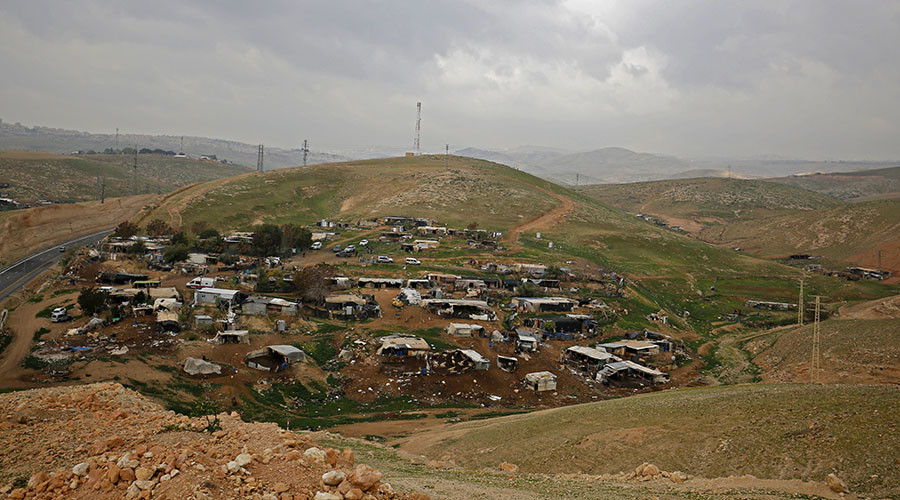
The European Union has delivered a public diplomatic rebuke to Israel, which plans to demolish 42 homes in a Bedouin village in the West Bank that are expected to make way for Jewish settlements, accusing it of breaking the Geneva Convention.
EU Ambassador to Israel Lars Faaborg-Andersen chose to voice the protest during a traditionally courteous introductory meeting between ambassadors of the 28 EU states and incoming Israeli Foreign Ministry director-general Yuval Rotem. As officials exchanged pleasantries in an upmarket Tel Aviv hotel, Faaborg-Anderson brought the room to a standstill to read a lengthy scathing message, approved by the EU’s security and diplomacy commission, with Rotem stood in the audience.
The Danish diplomat said that the demolition, ordered last month, of Khan Al-Akhmar, located east of Jerusalem in the West Bank's Area C, would result in the compulsory resettlement of about 140 residents, and the destruction of an Italian-funded school, which is providing education for over 150 children from the surrounding areas.
"The practice of enforcement measures such as forced transfers, evictions, demolitions and confiscations of homes and humanitarian assets (including EU-funded) and the obstruction of delivery of humanitarian assistance are contrary to Israel's obligations under international law,” said Faaborg-Andersen, whose comments were reported by Haaretz newspaper, which said that the incident happened last week, but was not reported until now.
"We therefore call on Israel, as the occupying power, to meet its obligations vis-à-vis the Palestinian population..., completely stop these demolitions and confiscations and allow full access of humanitarian assistance," added the EU envoy, who said that the demolition fell foul of “international humanitarian law and the 4th Geneva Convention.”
Despite the decision to raze a settlement that has existed in various forms for decades, Israel says that it is simply following its own regulations, as the houses in question were built without an official permit. The “tire school” – literally part-built from discarded tires - that has become a symbol of the demolition plan is actually not a part of it, as yet, and will have its fate reviewed by the legal system by the end of the year.
“Just as we did not approve illegal building by Jews in Amona, so we will not allow illegal construction by Palestinians,” explained Israeli Prime Minister Benjamin Netanyahu, when the visiting Italian foreign minister Angelino Alfano requested that the demolition be postponed last month.
While Khan Al-Akhmar is a small, impoverished settlement in what is already a deprived region, its significance is strategic. Israel is planning to construct a nearly-continuous belt of settlements around Jerusalem in Area C, the major part of West Bank which it completely controls and administers, and the village is a likely building site.
Palestinian officials have complained that the plan would isolate East Jerusalem, which the Palestinian Authority views as its future capital, and will foil the creation of a contiguous Palestinian state in the West Bank.
Faaborg-Andersen addressed the issue, calling on Israel to stop demolitions in the West Bank, which climbed to a recent record of 876 last year, simplify the procedure for issuing building permits in Area C, and meet the humanitarian needs of the local population, including providing easier access to drinking water.
“The EU and EU member states are united in the view that Area C is of critical importance to the viability of a future Palestinian state… and the EU continues to support the right of development of Palestinian communities in Area C,” said the diplomat.
***
CNN
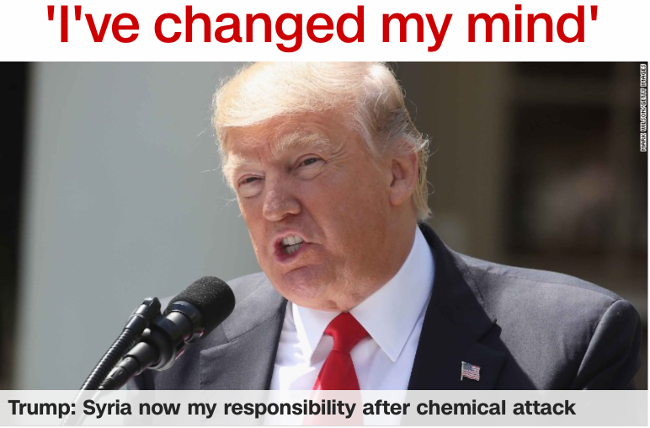
Trump: 'I now have responsibility' when it comes to Syria
By Theodore Schleifer and Dan Merica, CNN
Updated 0925 GMT (1725 HKT) April 6, 2017
Story highlights
Trump describes Syria attack as "affront to humanity"
Tillerson calls on Russia to reconsider support for Assad
Washington (CNN)President Donald Trump has described the chemical attack that killed more than 70 people in Syria as a "heinous" act that had changed his views on Syrian President Bashar al-Assad.
Speaking at a White House press conference, Trump said the attack had "crossed a lot of lines for me" and that it could not be tolerated.
Trump did not offer any details of how US strategy on Syria would change, and he did not directly criticize Russia, which has stood by Assad in the face of worldwide condemnation of the attack.
But Trump said details of the attack had affected him profoundly. "Yesterday's chemical attack, a chemical attack that was so horrific in Syria against innocent people, including women, small children and even beautiful little babies, their deaths were an affront to humanity," Trump said, speaking in the Rose Garden alongside Jordan's King Abdullah.
"These heinous actions by the Assad regime cannot be tolerated. The United States stands with our allies across the globe to condemn this horrific attack and all other horrific attacks, for that matter."
Earlier in the day, Trump's Secretary of State, Rex Tillerson, said there was "no doubt" that Assad was responsible for the attack on a rebel-held town in Idlib province, northwest Syria. He called on Russia to "really think carefully" about its continued support for Assad.
Syria denied using chemical weapons and blamed rebels for the carnage. Russia, Syria's strongest ally, said it had no warplanes in the vicinity and said the deaths were the result of a regime airstrike on a chemical weapons factory on the ground controlled by "terrorists."
Asked about the first statement released by the White House after the attack on Tuesday, which blamed the attack in part on the policies of former President Barack Obama, Trump said: "I now have responsibility, and I will have that responsibility and carry it very proudly."
Trump said that Obama, who in 2012 said the use of chemical weapons by the Syrian regime would be a "red line," had missed a "great opportunity" to deal with Assad.
"It is now my responsibility. It was a great opportunity missed," Trump said.
Trump maintained that Obama's failure to enforce his red line threat "was a blank threat (that) set us back a long ways, not only in Syria but in many other parts of the world."
At a hastily convened meeting of the United Nations Security Council, the US ambassador Nikki Haley strongly condemned Russia and the Syrian government. She suggested the US was open to using military action to end the country's ongoing civil war.
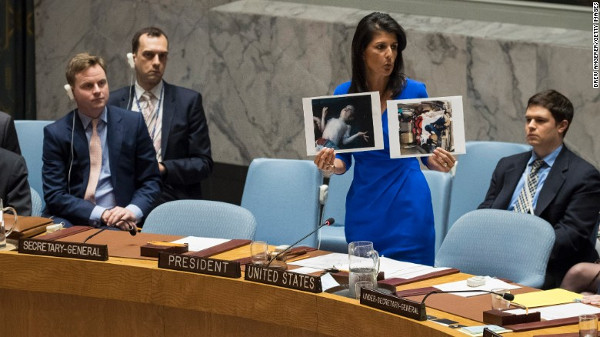
US Ambassador to the UN Nikki Haley holds up photos of victims of the Syrian chemical attack during a meeting of the Security Council.
"When the United Nations consistently fails in its duty to act collectively, there are times in the life of states that we are compelled to take our own action," Haley said. "For the sake of the victims, I hope the rest of the council is finally willing to do the same."
Trump also left the door open to new action in Syria. "You will see," Trump said when asked if he would take new action, according to pool reporters present when the President welcomed King Abdullah to the Oval Office.
"These are very troubled times in the Middle East, and we see what happened just recently yesterday in Syria -- horrible. Horrible, horrible thing. Unspeakable."
CNN's Kareem Khadder, Schams Elwazer, Elizabeth Roberts, Eyad Kourdi, Laura Koran and Tamara Qiblawi contributed to this report.
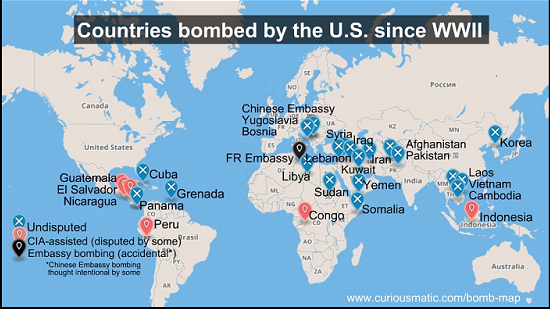
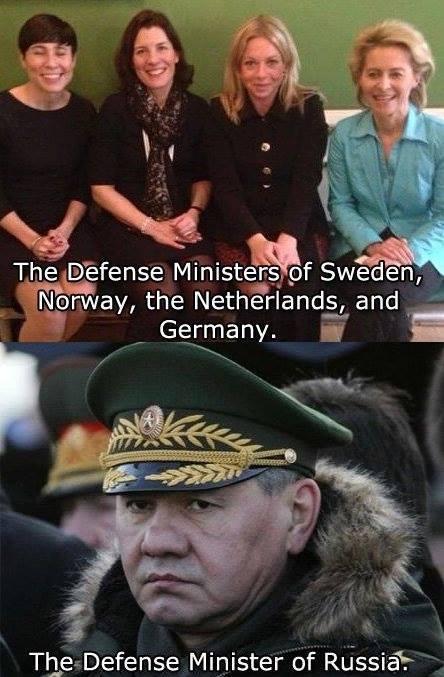
***
(This is very noteworthy as the attempted establishment of a gold-backed Dinar by Maummar Gadaffi of Libya and Saddam Hussein of Iraq is what led to their countries being destroyed and them being killed.)
Zero Hedge
Moscow And Beijing Join Forces To Bypass US Dollar In Global Markets, Shift To Gold Trade
by Tyler Durden
Apr 1, 2017 7:09 PM
The Russian central bank opened its first overseas office in Beijing on March 14, marking a step forward in forging a Beijing-Moscow alliance to bypass the US dollar in the global monetary system, and to phase-in a gold-backed standard of trade.
According to the South China Morning Post the new office was part of agreements made between the two neighbours "to seek stronger economic ties" since the West brought in sanctions against Russia over the Ukraine crisis and the oil-price slump hit the Russian economy.
According to Dmitry Skobelkin, the deputy governor of the Central Bank of Russia, the opening of a Beijing representative office by the Central Bank of Russia was a “very timely” move to aid specific cooperation, including bond issuance, anti-money laundering and anti-terrorism measures between China and Russia.
The new central bank office was opened at a time when Russia is preparing to issue its first federal loan bonds denominated in Chinese yuan. Officials from China’s central bank and financial regulatory commissions attended the ceremony at the Russian embassy in Beijing, which was set up in October 1959 in the heyday of Sino-Soviet relations. Financial regulators from the two countries agreed last May to issue home currency-denominated bonds in each other’s markets, a move that was widely viewed as intended to eventually test the global reserve status of the US dollar.
Speaking on future ties with Russia, Chinese Premier Li Keqiang said in mid-March that Sino-Russian trade ties were affected by falling oil prices, but he added that he saw great potential in cooperation. Vladimir Shapovalov, a senior official at the Russian central bank, said the two central banks were drafting a memorandum of understanding to solve technical issues around China’s gold imports from Russia, and that details would be released soon.
If Russia - the world's fourth largest gold producer after China, Japan and the US - is indeed set to become a major supplier of gold to China, the probability of a scenario hinted by many over the years, namely that Beijing is preparing to eventually unroll a gold-backed currency, increases by orders of magnitude.
Meanwhile, as the Russian central bank was getting closer to China, China was responding in kind with the establishment of a clearing bank in Moscow for handling transactions in Chinese yuan. The Industrial and Commercial Bank of China (ICBC) officially started operating as a Chinese renminbi clearing bank in Russia on Wednesday this past Wednesday.
"The financial regulatory authorities of China and Russia have signed a series of major agreements, which marks a new level of financial cooperation," Dmitry Skobelkin, the abovementioned deputy head of the Russian Central Bank, said.
"The launching of renminbi clearing services in Russia will further expand local settlement business and promote financial cooperation between the two countries," he added according to.
Irina Rogova, a Russian financial analyst told the Russian magazine Expert that the clearing center could become a large financial hub for countries in the Eurasian Economic Union.
*
Bypassing the US dollar appears to be paying off: according to the Chinese State Administration of Taxation, trade turnover between China and Russia increased by 34% in January, in annual terms. Bilateral trade in January 2017 amounted to $6.55 billion. China’s exports to Russia grew 29.5% reaching $3.41 billion, while imports from Russia increased by 39.3%, to $3.14 billion. Just as many suspected, with Russian sanctions forcing Moscow to find other trading partners, chief among which China, this is precisely what has happened.
The creation of the clearing center enables the two countries to further increase bilateral trade and investment while decreasing their dependence on the US dollar. It will create a pool of yuan liquidity in Russia that enables transactions for trade and financial operations to run smoothly.
In expanding the use of national currencies for transactions, it could also potentially reduce the volatility of yuan and ruble exchange rates. The clearing center is one of a range of measures the People's Bank of China and the Russian Central Bank have been looking at to deepen their co-operation, Sputnik reported.
One of the most significant measures under consideration is the previously reported push for joint organization of trade in gold. In recent years, China and Russia have been the world's most active buyers of the precious metal. On a visit to China last year, the deputy head of the Russian Central Bank Sergey Shvetsov said that the two countries want to facilitate more transactions in gold between the two countries.
"We discussed the question of trade in gold. BRICS countries are large economies with large reserves of gold and an impressive volume of production and consumption of this precious metal. In China, the gold trade is conducted in Shanghai, in Russia it is in Moscow. Our idea is to create a link between the two cities in order to increase trade between the two markets," First Deputy Governor of the Russian Central Bank Sergey Shvetsov told Russia's TASS news agency.
In other words, China and Russia are shifting away from dollar-based trade, to commerce which will eventually be backstopped by gold, or what is gradually emerging as an Eastern gold standard, one shared between Russia and China, and which may day backstop their respective currencies.
Meanwhile, the price of gold continues to reflect none of these potentially tectonic strategic shifts, just as China - which has been the biggest accumulator of gold in recent years - likes it.
MailOnline
Theresa May goes to war on Gibraltar: Ancient feud erupts as EU gives Spain the right to block the Rock from any Brexit deal
Spain has been handed the power to exclude Gibraltar from the final Brexit deal
It effectively hands Madrid a veto over the deal as May could be forced to leave the outpost in the wilderness or quit Brussels with no deal at all
MPs are outraged at the attempt to isolate GibralTar in the Brexit talks
By MARIO LEDWITH BRUSSELS CORRESPONDENT FOR THE DAILY MAIL and TIM SCULTHORPE, DEPUTY POLITICAL EDITOR FOR MAILONLINE
PUBLISHED: 00:54, 1 April 2017 | UPDATED: 06:38, 1 April 2017
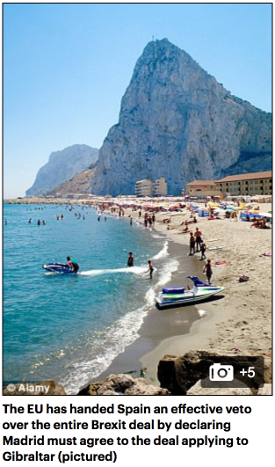
The centuries-old dispute over Gibraltar is threatening to halt Brexit negotiations after the EU yesterday backed Spain’s claim to the British territory.
Brussels chiefs sparked a diplomatic feud yesterday after including a veto for Madrid over the Rock’s future in their list of Brexit negotiating demands.
UK politicians accused the EU of orchestrating a ‘shameful’ attempt to inflame the historic territorial wrangle.
Despite Theresa May’s insistence that Gibraltar would not be used as a political pawn, the EU said Spain should be given a say over any future decisions relating to the territory.
The move threatened an early breakdown in negotiations after EU officials said they would not remove the clause. It also infuriated MPs, who said Britain ‘must not be bullied’ into compromises by Spain.
Tory MP Andrew Rosindell, of the all-parliamentary group on Gibraltar, said: ‘British people must and will stand together, we cannot be bullied by Spain.
‘Any agreement must apply equally to the whole British family and that includes Gibraltar. There can be no compromise on this.’
Jack Lopresti, Tory chairman of the all-party group, said: ‘It’s predictable given Spain’s previous behaviour, they would try to use Brexit as a fig leaf for trouble-making. It is shameful that the EU have attempted to allow Spain an effective veto over the future of British sovereign territory, flying in the face of the will of the people of Gibraltar.’
Madrid has already indicated it would block a deal over aircraft landing rights in Gibraltar, which could see flights grounded.
The decision to include the veto in the negotiating guidelines produced by European Council president Donald Tusk followed intense lobbying by Spanish diplomats.
EU sources also revealed Brussels has decided to depart from its current neutral position over the dispute following the Brexit result, and will now take Spain’s side on Gibraltar.
One senior EU official said: ‘The Union will stick up for its members and that means Spain now. There is a difference [now]. After Brexit is notified there is a Union of 27 and only one side of that argument is represented.’
Fabian Picardo, Gibraltar’s Chief Minister, last night accused the EU of ‘singling out’ the territory in an ‘unnecessary, unjustified and unacceptable’ way.
He said: 'This proposed singling out of Gibraltar and its people was the predictable machination of Spain that the people of Gibraltar foresaw and one of the reasons we voted so massively to remain in the EU.
'This is a disgraceful attempt by Spain to manipulate the European Council for its own narrow, political interests.
'Brexit is already complicated enough without Spain trying to complicate it further.'
Mr Picardo accused Spain of ‘holding the EU to ransom’ over Gibraltar’s airport, but insisted: ‘The whole EU should know: this changes nothing in respect of our continued, exclusive British sovereignty.’
The veto clause states no agreement between the EU and UK may apply to Gibraltar ‘without the agreement of Spain’. Explaining its inclusion, an EU official said: ‘The text means what it says. Any extension of [a] deal to Gibraltar, which is a disputed territory, will require the support of Spain.’
The veto demand follows months of increasingly antagonistic behaviour by Spain towards residents of the disputed territory, which became a British colony in 1830.
Following the EU referendum, in which Gibraltarians voted 96 per cent to remain, Spain’s then-foreign minister Jose Manuel Garcia-Margallo proclaimed the likelihood of a ‘Spanish flag on the Rock’.
Spanish officials yesterday celebrated the EU’s decision to give Madrid the power to shape Gibraltar’s future, claiming it as their ‘colony’. Senior Spanish MEP Esteban Gonzalez Pons pointed out that Theresa May failed to mention the territory in her letter to Mr Tusk on Wednesday invoking Article 50. He said this showed it was ‘a colony like St Helena’ rather than part of the UK.
But the accusation was immediately rebutted by No10, which said Mrs May spelled out her support for Gibraltar when she triggered the beginning of Brexit.
In the Commons on Wednesday, she said: ‘We are absolutely steadfast in our support of Gibraltar, its people and economy. We are very clear Gibraltar is covered by our Brexit negotiations.’
Foreign Secretary Boris Johnson has also given assurances the UK would mount a ‘rock-like resistance’ to any attempts to alter Gibraltar’s sovereignty.
British politicians accused the EU of needlessly trying to stir up a dispute during a sensitive diplomatic period.
The veto would let Spain block any aspects of a future relationship with the UK that it viewed as unfavourable, allowing officials in Madrid to wreak havoc during negotiations. For example, Spain is likely to insist that Gibraltar changes its ‘unfair’ 10 per cent corporation tax rate.
Spain defended the position today as minister Inigo Mendez de Vigo said 'this is an important point in the future negotiations of the United Kingdom's exit from the EU'.
A senior diplomat in Brussels said: 'This seems intended to give Spain something so they don't try to hold the whole withdrawal treaty hostage over it.'
Conservative MP Bob Neill said: 'Gibraltar's friends in the UK will be watching this very carefully. There will be no sell out.'
Liberal Democrat foreign affairs spokesman Tom Brake said it showed the Government's Brexit strategy was potentially damaging to the future of the Rock.
Mr Brake said: 'Confirmation that Gibraltar's future must be agreed by the UK and Spain shows just how damaging the Government's hard Brexit will be on this strategically-important British territory.
THE ONE SENTENCE THAT COULD TRASH THE WHOLE DEAL
The EU's Gibraltar bombshell was revealed in a single sentence of the nine page draft guidelines.
It hands Spain a veto over whether the Brexit deal applies to Gibraltar - something which could make the entire deal untenable for Britain.
It reads: 'After the United Kingdom leaves the Union, no agreement between the EU and the United Kingdom may apply to the territory of Gibraltar without the agreement between the Kingdom of Spain and the United Kingdom.'
'Theresa May must urgently produce a plan that protects the citizens of Gibraltar, including their businesses and communities.
'It is our obligation to support our overseas territories, and any attempt to brush off the importance of this issue is a dereliction of duty by the Government.
'Only the Lib Dems are fighting against hard Brexit, and to keep the UK's place in the single market.'
As he unveiled the draft guidelines, Mr Tusk warned Theresa May she must strike a deal on the Brexit divorce bill, migrant rights, business rules and the Irish border before trade talks can start.
The EU Council President made a small concession to Mrs May by indicating he would allow some talks to run side by side before the divorce is finalised - potentially as soon as this autumn.
But at a press conference Mr Tusk confirmed 'parallel talks will not happen' despite the Prime Minister demanding everything be discussed at once four times in her Article 50 letter.
The details of the EU's position were spelt out in a set of draft negotiating guidelines which represent the official response to Mrs May's historic letter. Mr Tusk said he was not seeking a 'punitive' deal, warning 'Brexit is punishment enough'.
Agreeing the cost of Brexit will be a huge sticking point in the first phase of the negotiations as Europe is expected to demand up to £50billion - dwarfing the £3billion figure thought acceptable by ministers.
Striking an agreement on the rules imposed on companies after Brexit could also be difficult. Mr Tusk's letter suggests the EU wants to stop Britain slashing taxes and regulation in an effort to stop a 'race to the bottom'.
Agreements on the rights of EU citizens in Britain and the Irish border will be complicated but striking a deal is firmly supported on both sides.
The draft negotiating guidelines for the EU's position in the Brexit talks demand 'sufficient progress' be made on agreeing the divorce before trade deal talks start.
Deciding when that point is reached is entirely up to the EU and is not something Britain can declare.
EU'S NEGOTIATING PRINCIPLES AT A GLANCE
Donald Tusk unveiled the EU's negotiating priorities for Brexit today.
According to the document, Britain will not be allowed the same rights and benefits of the Single Market as a full member.
There can be no 'cherry picking' of the four freedoms.
The Union will negotiate as a single entity - there will be no individual negotiations with member states
The objective of phase one of the negotiations will be to ensure an 'orderly withdrawal'.
Priorities will be:
To manage disentangling Britain from EU laws and treaties
Providing clarity and certainty to businesses and citizens
To arrange 'reciprocal, enforceable' guarantees to EU citizens in the UK and British citizens abroad
Ensuring Britain complies with all financial obligations
The EU will not accept a hard border between Northern Ireland and the Republic of Ireland
***
Is Putin the 'Preeminent Statesman' of Our Times?
PAT BUCHANAN • MARCH 31, 2017
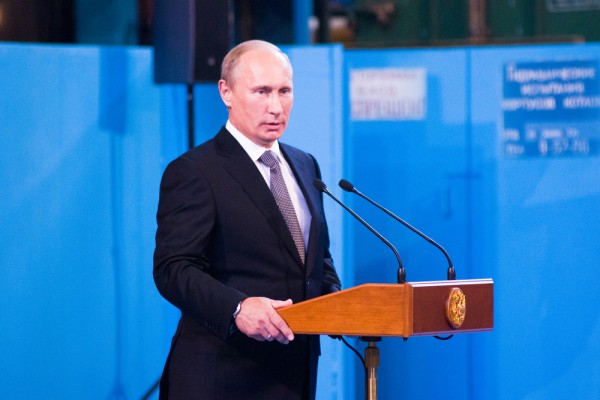
“If we were to use traditional measures for understanding leaders, which involve the defense of borders and national flourishing, Putin would count as the preeminent statesman of our time.
“On the world stage, who could vie with him?”
So asks Chris Caldwell of the Weekly Standard in a remarkable essay in Hillsdale College’s March issue of its magazine, Imprimis. [How to Think About Vladimir Putin, March 2017]
What elevates Putin above all other 21st-century leaders?
“When Putin took power in the winter of 1999-2000, his country was defenseless. It was bankrupt. It was being carved up by its new kleptocratic elites, in collusion with its old imperial rivals, the Americans. Putin changed that.
“In the first decade of this century, he did what Kemal Ataturk had done in Turkey in the 1920s. Out of a crumbling empire, he resurrected a national-state, and gave it coherence and purpose. He disciplined his country’s plutocrats. He restored its military strength. And he refused, with ever blunter rhetoric, to accept for Russia a subservient role in an American-run world system drawn up by foreign politicians and business leaders. His voters credit him with having saved his country.”
Putin’s approval rating, after 17 years in power, exceeds that of any rival Western leader. But while his impressive strides toward making Russia great again explain why he is revered at home and in the Russian diaspora, what explains Putin’s appeal in the West, despite a press that is every bit as savage as President Trump’s?
Answer: Putin stands against the Western progressive vision of what mankind’s future ought to be. Years ago, he aligned himself with traditionalists, nationalists and populists of the West, and against what they had come to despise in their own decadent civilization.
What they abhorred, Putin abhorred. He is a God-and-country Russian patriot. He rejects the New World Order established at the Cold War’s end by the United States. Putin puts Russia first.
And in defying the Americans he speaks for those millions of Europeans who wish to restore their national identities and recapture their lost sovereignty from the supranational European Union. Putin also stands against the progressive moral relativism of a Western elite that has cut its Christian roots to embrace secularism and hedonism.
The U.S. establishment loathes Putin because, they say, he is an aggressor, a tyrant, a “killer.” He invaded and occupies Ukraine. His old KGB comrades assassinate journalists, defectors and dissidents.
Yet while politics under both czars and commissars has often been a blood sport in Russia, what has Putin done to his domestic enemies to rival what our Arab ally Gen. Abdel-Fattah el-Sissi has done to the Muslim Brotherhood he overthrew in a military coup in Egypt?
What has Putin done to rival what our NATO ally President Erdogan has done in Turkey, jailing 40,000 people since last July’s coup — or our Philippine ally Rodrigo Duterte, who has presided over the extrajudicial killing of thousands of drug dealers?
Does anyone think President Xi Jinping would have handled mass demonstrations against his regime in Tiananmen Square more gingerly than did President Putin this last week in Moscow?
Much of the hostility toward Putin stems from the fact that he not only defies the West, when standing up for Russia’s interests, he often succeeds in his defiance and goes unpunished and unrepentant.
He not only remains popular in his own country, but has admirers in nations whose political establishments are implacably hostile to him.
In December, one poll found 37 percent of all Republicans had a favorable view of the Russian leader, but only 17 percent were positive on President Barack Obama.
There is another reason Putin is viewed favorably. Millions of ethnonationalists who wish to see their nations secede from the EU see him as an ally. While Putin has openly welcomed many of these movements, America’s elite do not take even a neutral stance.
Putin has read the new century better than his rivals. While the 20th century saw the world divided between a Communist East and a free and democratic West, new and different struggles define the 21st.
The new dividing lines are between social conservatism and self-indulgent secularism, between tribalism and transnationalism, between the nation-state and the New World Order.
On the new dividing lines, Putin is on the side of the insurgents. Those who envision de Gaulle’s Europe of Nations replacing the vision of One Europe, toward which the EU is heading, see Putin as an ally.
So the old question arises: Who owns the future?
In the new struggles of the new century, it is not impossible that Russia — as was America in the Cold War — may be on the winning side. Secessionist parties across Europe already look to Moscow rather than across the Atlantic.
“Putin has become a symbol of national sovereignty in its battle with globalism,” writes Caldwell. “That turns out to be the big battle of our times. As our last election shows, that’s true even here.”
Patrick J. Buchanan is the author of the new book “The Greatest Comeback: How Richard Nixon Rose From Defeat to Create the New Majority.”
***
***
HEATSTREET
All You Need is Cash! How the Summer of Love Turned into the Summer of Lucre
By D.J. Taylor

Early in August 1967, the Beatles’ George Harrison, then on a week-long visit to California, decided to pay a visit to Haight-Ashbury, San Francisco. Here, guitar clutched across his chest, he is supposed to have strolled troubadour-like among the bead-strung and be-kaftaned crowd, singing the newly-written Lennon-McCartney composition ‘Baby You’re a Rich Man.’
And what did George make of the center of the West Coast hippy movement? According to the Beatles publicist Derek Taylor, who was riding shotgun, his reaction was only just short of disgust. The Haight, it soon became apparent, was simply a magnet for ‘ghastly drop-outs, bums and spotty youths, all of them out of their brains.’ Benign and enthusiastic when the Beatle began his walkabout, the mood of the crowd turned sour when he declined the offer of some STP. Shortly afterwards, Harrison and his entourage beat a hasty retreat.
One of the oddest aspects of the ‘Summer of Love’, whose half-century commemorations are already kicking into gear in America and the UK, is how quickly the bloom came off its reputation and how rapidly cultural critics changed their minds about a phenomenon that had previously been treated with a certain amount of respect.
Ominously, the detractors included not only many original hippies, convinced that by entering the mainstream media the movement had ‘sold out’, but contemporary satirists who took one look at the world of open air festivals, ‘flower power’ and psychedelic drugs and knew instinctively that they were onto a good thing.
Of all the withering send-ups included on Frank Zappa and the Mothers of Invention’s We’re Only In It For The Money (1967), whose cover pastiches the Beatles’s Sgt. Pepper, perhaps the most withering of all is a song called ‘Flower Punk’, with its lines about ‘Hey punk, where you going with that button on your shirt?/I’m going to the love-in to sit and play my bongos in the dirt.’
‘Flower Punk’ ends with a monologue in which its spaced-out protagonist, avid to go ‘down to ‘Frisco and join a psychedelic band’ wonders how he’ll spend the royalties that will doubtless accrue to him when their record gets on the charts (‘No, I’ll buy a Harley Davidson’ etc).
But the suspicion that the Summer of 1967, while attracting a great deal of genuine utopian fervor, was also a smokescreen for large numbers of bandwagon-jumpers who would ultimately prove to be quite as materialistic as the society they began by condemning, went well beyond Frank Zappa. To examine the beliefs and later careers of some of the countercultural heroes of the late 1960s is an instructive business, if only because most of them turn out not to have held the views with which they were widely credited or not to have thought through the positions that their records took up.
Take, for example, one of the Summer of Love’s most successful set of spokesmen, the Jefferson Airplane. The Airplane’s songs, most of them written by Paul Kantner and/or Marty Balin, virtually seethe with anti-materialistic and world-changing sentiment. ‘We Can Be Together’ contains the lines ‘All your private property is/Target for your enemy/And your enemy is we’, while the rallying cry ‘Volunteers of America’ urges its listeners to ‘Look what’s happening out in the streets/Got a revolution, got to revolution.’
Looking back on the era from the vantage point of the early 2000s, other band members were more sceptical. ‘I don’t think there was tremendous deep thought about the situation’ bassist Jack Casady recalled, while guitarist Jorma Kaukonen reckoned songwriter Kantner to be ‘very politically naïve…I suspect that neither one of us really knew very much about what was going on.’
Other rock icons of the era merely harbored opinions that radical youth would have deeply distrusted, had they known that they existed. William Rees-Mogg, editor of the Times newspaper, who was commissioned to interview the Rolling Stones’ Mick Jagger for the British television programme World in Action a few days before George Harrison arrived in San Francisco, was somewhat taken aback to discover not a left-leaning communalist but ‘a rightwing libertarian…straight John Stuart Mill.’
The same point could be made of the Beatles’ John Lennon, co-author of 1967’s single most influential song, the era-defining ‘All You Need is Love.’ To be sure, Lennon enjoyed a militant early 1970s phase, when he was nearly kept out of the US as a subversive, but he reacted to the political turmoil of 1967/8 by writing ‘Revolution’ (‘But if you go carrying pictures of Chairman Mao/You ain’t gonna make it with anyone anyhow’) and spent the last few years of his life happily buying up real estate in Manhattan’s Dakota Building which he inhabited with his wife, Yoko Ono.
As for the music in which the ideological underpinnings of the Summer of Love found expression, this, by the end of the 1960s, had been presented with a stark choice. Either it could remain self-consciously low-key, communal and self-sustaining, or it could ally itself with big business. With a few gallant exceptions, who attempted to stay true to their original ideals, it chose the latter.
In fact, the corporate rock and roll that came to dominate the western music scene from the early 1970s onwards may be seen as libertarian capitalism in one of its purest forms, in which every sinew is stretched in identifying a product and shaping it for public consumption, marketing and distributing it in such a way as to achieve maximum returns, harnessing the power of an economic system designed to facilitate its success.
As Neal Schon of the multi-platinum ‘70s group Journey once put it: ‘You start a business in America and America works with you. We’re a trucking business as well as light and sound, and we’re into real estate.’ None of this, naturally, is to mock the bygone radicals who went on to make such a killing from consumer capitalism – Johnny Rotten of the Sex Pistols promoting butter (or most recently Brexit) or Iggy Pop featuring in car adverts.
Livings need to made, and how many rock stars have access to the average CEO’s index-linked pension? But to look back on the Summer of Love is instantly to become aware of a cultural movement that was warped and commercialized almost before it started, that rapidly metamorphosed into the thing it began by wanting to defy, and could hardly be accused of betraying its ideals because it barely possessed any in the first place.
In the end, it took not much more than the bat of an eye before ‘All You Need Is Love’ turned into ‘All You Need Is Cash.’
***
Natural News
New study claims using GPS “disables” parts of the human brain
Saturday, April 01, 2017 by: Isabelle Z.
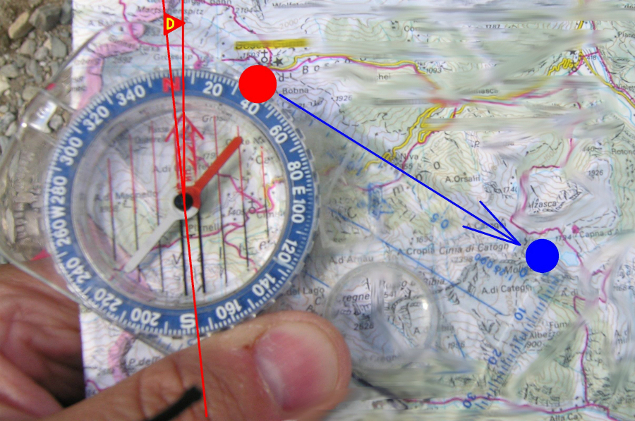
(Natural News) One of the most useful features that modern technology has brought us is mapping software that uses the Global Positioning System (GPS) network. This worldwide satellite navigation system uses a network of satellites and receivers to determine location, and it’s used in many vehicles and smartphones to help people reach their destinations in the least amount of time. While anyone who has ever been lost in a sketchy neighborhood will tell you just how vital this tool is, there is also a pretty big downside: it may be hurting your brain.
A study from University College London found that relying on GPS navigation essentially turns off the parts of your brain that you would have used to simulate different routes had you not been using GPS. This conclusion was reached after studying 24 volunteers who navigated a simulation of central London’s Soho district, while undergoing brain scans.
The scientists were looking at activity in the part of the brain responsible for navigation and memory known as the hippocampus, along with the part involved in decision-making and planning, the prefrontal cortex. Scientists say that the hippocampus helps you simulate journeys on potential paths, while the prefrontal cortex helps you to choose which way to go. The researchers mapped the streets of London in an effort to learn more about how these parts of the brain would react to them. (RELATED: Read more news headlines about brain function and brain health at BRAIN.news.)
When the study’s volunteers navigated the streets manually, spikes in activity were seen, in the prefrontal cortex and hippocampus alike, when they entered new streets. When there were more options to choose from, their brain activity rose accordingly.
For example, entering a dead-end street brought about a reduction in activity, while entering a junction where several streets converge would boost activity in the hippocampus significantly. However, when the volunteers were simply following instructions given by the GPS system on the same streets, there was no additional brain activity. The researchers say this indicates the brain has “switched off its interest in the streets around us.”
They also looked at street networks in big cities around the globe to determine the difficulty of navigating them. Manhattan’s grid system requires comparatively little effort, given the fact that you can only go left, right or straight at each junction, whereas navigating London can be much more taxing on the hippocampus, given its complex layout with multiple junctions and roundabouts. This could also explain why London cab drivers have bigger hippocampi than average people, but the city’s bus drivers, who tend to follow pre-determined routes, do not. The study was published in the Nature Communications journal.
This information can be used by smart tech companies, architects and developers to design spaces that people will find easy to navigate. For example, they can give care homes and hospitals layouts that will not create confusion for people with dementia. At a time when Alzheimer’s is rising dramatically – with today’s figure of more than 5 million Americans living with the disease, which is expected to climb to 16 million by 2050 – this knowledge can be incredibly useful in improving people’s quality of life and avoiding causing undue stress.
Having a GPS system is incredibly useful, but if you want to keep your brain functioning optimally, try to work out routes yourself as much as possible and stick to using the GPS as a backup or for emergencies. Reserve your mapping apps for those times when you’re running late for an important work meeting, for example, but consider letting your brain do the work when you’re looking for that new park for your family’s picnic this weekend.
Sources include:
ScienceDaily.com
ALZ.org
TheGuardian.com
***
Until
next week...keep on believing.
Almondtree Productions
“For thou, Lord, shalt bless the righteous: thou hast compassed us as with a shield of favour.”
(Psalm 5:12)